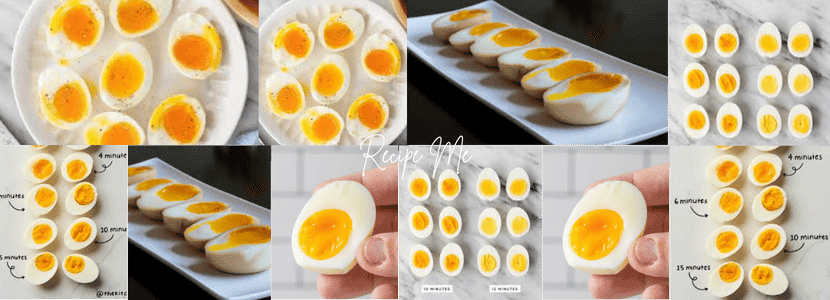Never Fail Again: A Guide to How Long to Boil Eggs for Perfect Results

Have you ever bitten into an allegedly soft-boiled egg and ended up with a runny half cooked mess? Or more horrifying, peeled a so-called hard-boiled egg, only to find a chalky-grey yolk with an inexplicable green dividing-line around it? The quest for the perfect boiled egg is a common kitchen dilemma. It appears so painless yet the outcome proves to be frustratingly helter-skelter. Bearing out whether it is a jammy-in-the-middle egg that you need on your avocado toast, or a firm one that you can rip into a salad, timing is everything. It is the question of scientific accuracy and some household skills. This comprehensive guide will not only answer the age-old question of “how long to boil eggs?” but will also show you the inviolate methods of doing it that you require in order always to get the precise effect desired in one single instance, and make you a real connoisseur in boiled eggs.
The Science Behind the Perfect Boiled Egg
Now forgive me but before we go into time let me give you a bit about what is actually going on inside the shell. Eggs consist of two parts; that is, the white and yolk. The protein and water in an egg white occur mainly in the egg white. When heated, the molecules of protein straighten out and bind each other into a solid opaque gel, making the clear liquid turn to solid. The yolk in contrast, is a hydrated combination of fat, protein and water. It is left cooking at a higher temperature than the white making it remain creamy and runny much after the white has set. The key to the perfect boiled egg is understanding these different cooking times and pulling the egg from the heat at just the right moment. To get the classic green ring around a boiled yolk, there must be overcooking hence a chemical reaction happened between the sulfur of the egg white and iron of the yolk.
The Foolproof Method: Boiling Eggs from Start to Finish
There are a few different methods for boiling eggs, but the one that provides the most consistent results is the “bring to a boil, then turn off the heat” technique. This low-key procedure helps the eggs not to rattle around in the pot and crack, and provides you with an accurate schedule of when they are done.
Step 1: The Setup
Put your eggs into a pot in one layer.
Put the eggs in fresh as much as an inch of cold water.
Put in a few grains of salt and a dash of vinegar into the water. The salt will avoid a mess even in the event of an egg breaking and the vinegar can also seal cracks.
Step 2: The Boil & Steep
Boil the water on high, until it begins rolling.
As soon as water boils hard turn off the heat.
With a lid put on the pot, allow the eggs to steep or sit in the hot water for the given amount of time, depending on how you want them done.
Step 3: The Cold Shock
When the time is over, stir the eggs with a slotted spoon and put them in a bowl of ice water.
This cold shock freezes the cooking process and peels the eggs a lot easier. Peel after 5 minutes sitting down in the ice water.
A Detailed Guide to How Long to Boil Eggs
This is the key in the whole process. Here is a convenient quick reference chart on how long you need to have your eggs boiled to your preference.
For a Soft-Boiled Egg (Jammy Yolk):
4 minutes: Yolk very soft, liquid; white a little set. Great to dunk toast soldiers.
5 minutes: Classically done, mellow soft-boiled egg accompanied by a firm white and a beautifully creamy, jammy yolk. Best suited in ramen bowls and cream pasta.
6 Minutes: the jammy egg. The yolk is completely set and at the same time it is a beautiful, perfect and moist centre. Very good in salads, or eat by itself with some salt.
For a Medium-Boiled Egg:
7-8 minutes A medium-boiled egg is at this sweet spot. This is a cooked but soft in the middle yolk. The white is entirely decisive. This is an excellent universal egg.
For a Hard-Boiled Egg:
9 minutes: The yolk is hard but some shades of yellow-green are still in and the creaminess is maintained.
When 10-12 minutes are reached, a hard-boiled egg is cooked. The yolk is firm and lighter yellow and the white is solid. This is when deviled eggs, egg salad or cutting in half to make up sandwiches are the best. More than 12-minutes of cooking should be avoided because it also results in a chalky texture and the annoying green ring.
Did You Know? Your eggs getting peeled can depend on the age of the eggs. Eggs peel more readily when old as they have altered pH level during the aging process which facilitates a growth between the membrane and the shell making it easy to peel.
Troubleshooting Common Boiled Egg Problems
My eggs are cracking why? Submerging the cold eggs to the boiling vat or shaking them too hard are the most prevalent wrongdoers. This can be avoided by using cold water and bringing to a boil and turning off the heat.
What causes them to be tough to peel? As said, peeling fresh eggs may be hard. Cold water shock is an essential technique when it comes to ensuring that the process of peeling is easier. Another attempt you may take is using the running water to peel the egg.
My yolk is grey/green Why? A sure indicator of overcooking is this. The best way is to follow the recommended times to prevent this chemical reaction so that your yolks are beautiful, healthy yellow.
The Final Word on Perfect Boiled Eggs
Boiling an egg can be considered one of the simplest skills to master and how much happiness and utility does it add to your kitchen. It is a matter of the difference between a fast and healthy snack and a food waste. The truth is, there’s no single right answer to “how long to boil eggs?” Everything depends on your own preference of time. You no longer need to worry or fret, because with this guide you can make a perfectly soft, jammy or hard-boiled egg and you can now do that with confidence, every time. Therefore, just get some eggs, go read your book, and give egg your time. And you deserve it!
Discover Related Articles and Resources
| Action | Description | Button Text | External Link |
|---|---|---|---|
| Read Related Article | Discover more about this topic and enhance your knowledge with our related article. | Read More | allrecipes |
| Watch the Video | Watch this insightful video for deeper understanding and tips. | Watch Now |
|
Frequently Asked Questions
Q.What are the exact timings for soft, medium, and hard-boiled eggs?
A.This the million dollar question! For an average large egg, start it in a bowl with cold water bring to a rolling boil and then set a timer. For a soggy, drippy yolk (soft-Boiled) go for 4-5 minutes. To achieve a yummy jammy, half-cooked yolk (boiled merely through the middle) goat for 7-8 minutes. And for an ultra firm, totally yellow yolk (overcooked), cook for 10–12 min.
Q.Why do my eggs always seem to crack while they’re boiling?
A.Isn t that sodding frustrating? The most widespread one is the shock of a cold egg in the hot water. To avoid this, the simplest solution would be to put your eggs in the pot first, then pour on them some cold water and set it all to boil jointly. This slow change of temperature is so much more tender towards the shells.
Q.My hard-boiled eggs are impossible to peel! What’s the secret?
A.The final secret is not age of the egg but, ice bath! You must transfer your egg into an oversized bowl of ice-cold water with a slotted spoon as soon as they are cooked. Have them cool off in there not any less than 5-10 minutes. This is very quick cooling process which helps the egg white separate from the shell and they are a nightmare to peel.
Q.What’s that gross green or grey ring around the yolk? Are my eggs bad?
A.Whatever you do, don EAT your eggs! That greyish-green ring is only the harmless combination of iron in yolk and sulfur in the white. It is nothing but the indicator that there was an egg that was overcooked slightly. In order to prevent the problem, one simply needs to adhere to the 10-12 minutes cooking time period of hard-boiled eggs and cool them off within an ice bath.
Q.Should I put my eggs in the water before it boils or after?
A.There are two schools of thoughts although to be most consistent, crack free, we suggest the cold water method. Placing eggs in the pot and covering them with cold water prior to switching on the heat permits softer warming up of eggs and eliminates the risk of cracking. Some chefs boil eggs in water with the expectation that it would take a given amount of time, but in cold-start method, home cooks need not be that strict with their calculations.
Q.Do I really need to use older eggs to make them easier to peel?
A.This is a quite ancient kitchen wisdom, however, it is no longer the most critical thing! The fact that in some cases the very fresh eggs are even a little harder is also true; however, the ice bath trick is much more solid than attempting to age your eggs impeccably. Therefore, you need not be concerned with how old your eggs are, but nail the cooking time and the ice bath and you will get great results.
